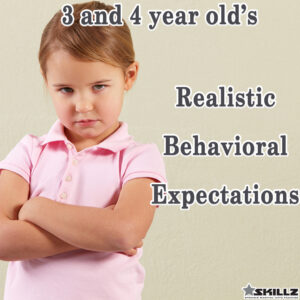 Children between the ages of 3 and 4 are at a very unique growth period in their lives. They are growing at a rapid rate in all areas of development and are discovering new things daily, while also learning how to cope with new challenges. Additionally, they are in pursuit of autonomy, which can lead to behavioral issues that the adults in their lives often become frustrated with.
Children between the ages of 3 and 4 are at a very unique growth period in their lives. They are growing at a rapid rate in all areas of development and are discovering new things daily, while also learning how to cope with new challenges. Additionally, they are in pursuit of autonomy, which can lead to behavioral issues that the adults in their lives often become frustrated with.
The problem comes in because most adults have unrealistic expectations of how 3- and 4-year-olds should behave. This is mainly based on the assumption by the adult that this rapid development will progress in only a positive behavioral direction. The fact is, as with any growth, there will be new issues that present themselves and old issues that may still arise. In addition, children’s behaviors are not consistent or predictable.
Gaining knowledge of age-appropriate behaviors for 3- and 4-year old’s is essential to helping instill positive behaviors. At this age, because they are learning new things, 3- and 4-year-olds may become more defiant as they see how far they can push limits. They may also become frustrated or anxious when trying new things because their motor skills are not as developed and their attempts at things may not go as planned. This can lead to behavior problems such as tantrums and defiance.
To assist them in making better behavior choices, its important that adults are calm, clear, and consistent. In the heat of a tantrum, it is often very difficult to remain calm, but this is vital. It is also important to be clear in the rules that are set and maintain consistency with this daily. Giving choices also helps children become more autonomous which will lead to more confidence. Catch them being good and reward positive behaviors.
In the SKILLZ program, our instructors are trained on how to reinforce proper development and behavior with little or no disciplinary action. This positive learning atmosphere makes learning and growing fun. Self-esteem also plays an important role in how well 3- and 4-year-olds learn and grow. Utilizing edutainment and communicating clear rules and directions set the tone for each class. The instructors also connect with each student to make the environment warm and positive.
And, as with any well-rounded children’s program, the teaching team of parent and instructor is of the upmost importance. Creating consistency between school and home, makes for an easier transition through this rapid growth period for 3- and 4-year-olds.
Remember, growth is exciting, but the progress is often followed by some backtracking…that is just part of growing up. As Ross A. Thompson, Ph.D., a child-development researcher and professor of psychology at the University of California, Davis says, "The part of a child's brain that controls his impulses and emotions matures very, very slowly. It's easy to assume that kids are being uncooperative or obstinate when really they're just acting their age." Be patient and consistent and the behavioral changes that this age group experiences will go more smoothly.





